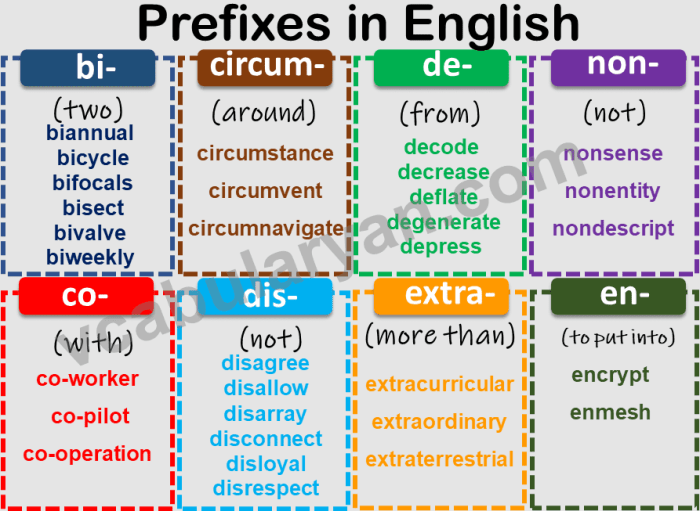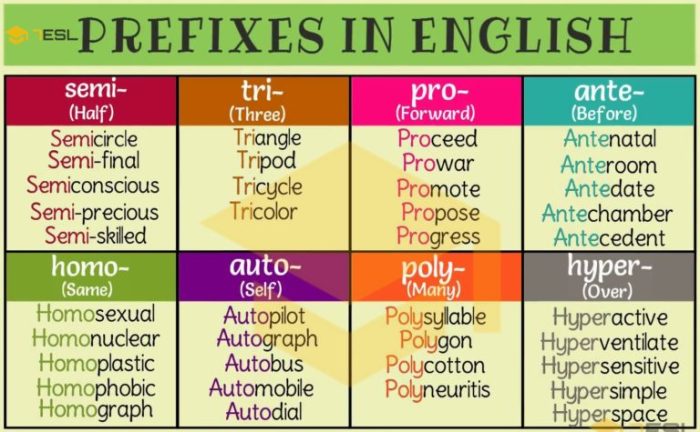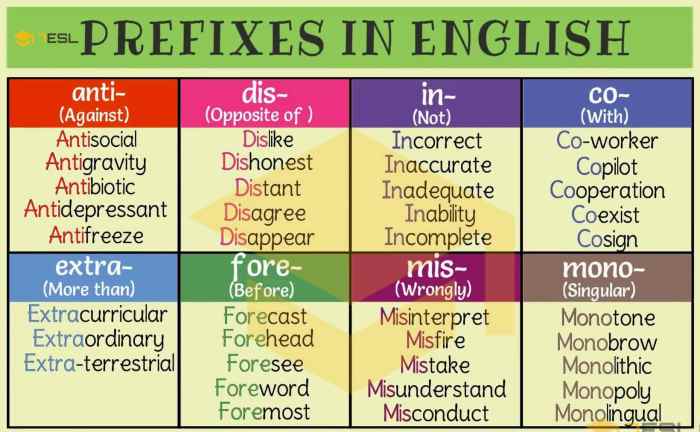Words with the prefix hypo – Words with the prefix “hypo” hold a fascinating place in the English language, bridging the worlds of medicine, science, and everyday speech. This prefix, derived from the Greek word “hypo,” meaning “under” or “below,” adds a distinctive flavor to numerous terms, offering insights into various concepts and conditions.
From medical terminology to scientific jargon and even casual conversations, the prefix “hypo” plays a pivotal role in shaping the meanings and connotations of words. Join us as we delve into the captivating realm of words with the prefix “hypo,” unraveling their origins, exploring their usage, and discovering the nuances that make them an integral part of our linguistic landscape.
Prefix “Hypo” in Medical Terminology

The prefix “hypo” is commonly used in medical terminology to indicate a condition of deficiency or below-normal levels.
In medical terms, the prefix “hypo” is used to describe a condition where there is a deficiency or below-normal levels of a particular substance or condition. For example, “hypoglycemia” refers to a condition where there is a deficiency of glucose in the blood, while “hypotension” refers to a condition where there is a deficiency of blood pressure.
Examples of Medical Terms with the Prefix “Hypo”
- Hypothyroidism:A condition where the thyroid gland does not produce enough thyroid hormone.
- Hypothermia:A condition where the body temperature drops below normal.
- Hyponatremia:A condition where the sodium levels in the blood are abnormally low.
Significance of Using the Prefix “Hypo” in Medical Communication
The prefix “hypo” is an important part of medical terminology as it helps to provide a concise and accurate description of a medical condition. By using the prefix “hypo”, medical professionals can quickly and easily communicate the nature of a patient’s condition to other healthcare providers, ensuring that the patient receives the appropriate treatment.
Words with the Prefix “Hypo”: Words With The Prefix Hypo

The prefix “hypo” originates from the Greek word “hypo,” meaning “under” or “beneath.” When added to words, it signifies a deficiency, decrease, or abnormal condition. This prefix is commonly used in medical and scientific terminology, as well as in everyday language.
Categorization of Words with the Prefix “Hypo”
Words with the prefix “hypo” can be categorized into several groups:
Medical Terms
| Term | Meaning |
|---|---|
| Hypoglycemia | Low blood sugar |
| Hypothermia | Abnormally low body temperature |
| Hypotension | Low blood pressure |
| Hypothyroidism | Underactive thyroid gland |
| Hypovolemic shock | Shock caused by a decrease in blood volume |
Scientific Terms
| Term | Meaning |
|---|---|
| Hypodermis | The layer of tissue beneath the skin |
| Hypocenter | The point beneath the Earth’s surface where an earthquake originates |
| Hyposulfite | A salt containing the ion S2O32- |
| Hypothermia | A state of reduced metabolic activity in response to cold temperatures |
Everyday Words
- Hypocrite
- Hypotenuse
- Hypoallergenic
- Hypodermic
- Hypothermia
Etymology and Origin of “Hypo”

The prefix “hypo” has a rich etymological history, tracing its roots back to ancient Greek. It is derived from the Greek word “hypo,” which means “under” or “beneath.” This root has been used in various languages to denote concepts of inferiority, deficiency, or being below something.
Greek Origins
In ancient Greek, “hypo” was often used as a prefix to indicate a lower position or status. For example, the word “hypokrites” (literally, “one who answers from below”) referred to an actor who spoke from a lower stage. This sense of inferiority or subordination carried over into the medical field, where “hypo” was used to describe conditions that were considered to be below normal or deficient.
Evolution in Medical Terminology
As medical knowledge advanced, the prefix “hypo” became increasingly common in medical terminology. It was used to describe conditions characterized by a deficiency or lack of a particular substance or function. For example, “hypothyroidism” refers to a condition where the thyroid gland does not produce enough thyroid hormone.
Similarly, “hypoglycemia” refers to a condition where blood sugar levels are abnormally low.
Prefixes can be a bit tricky, but understanding them can unlock a whole new world of words. Take “hypo,” for example. It means “under” or “below.” And guess what? It’s the secret ingredient in words like “hypothermia” and “hypnosis.” But enough about words.
Let’s talk about something delicious: wok fried chicken lazy dog . Now, that’s a dish worth getting excited about. But back to our prefixes, “hypo” is a versatile little thing. It can even make a dog sound lazy!
Significance of Etymology
Understanding the etymology of “hypo” is essential for comprehending its current usage in medical terminology. It helps us recognize that the prefix typically indicates a deficiency or abnormality. This knowledge aids in interpreting medical terms and understanding the nature of the conditions they describe.
Synonyms and Antonyms of “Hypo”

The prefix “hypo” typically conveys a sense of deficiency, inadequacy, or lowness. It can also indicate a position or location below or beneath something.
Here are some synonyms and antonyms of the prefix “hypo”:
Synonyms
- Under: below or beneath something in position or rank
- Sub: below or beneath something in position or rank
- Infra: below or beneath something in position or rank
- Hypo: below or beneath something in position or rank
- Insufficient: not enough or adequate
- Deficient: lacking something essential or necessary
Antonyms
- Hyper: above or beyond something in position or rank
- Super: above or beyond something in position or rank
- Over: above or beyond something in position or rank
- Excessive: more than enough or necessary
- Sufficient: enough or adequate
Examples and Usage of “Hypo”

The prefix “hypo” finds practical application in various fields, including medicine, science, and everyday language. Here are some real-world examples that demonstrate its usage:
In Medicine
- Hypoglycemia:Abnormally low levels of glucose in the blood, often leading to weakness, dizziness, and confusion.
- Hypothermia:A condition where the body’s core temperature drops dangerously low, causing shivering, confusion, and potentially life-threatening complications.
- Hypothyroidism:An underactive thyroid gland, resulting in symptoms such as fatigue, weight gain, and impaired cognitive function.
In Science
- Hypothesis:A tentative explanation or prediction that serves as the basis for further investigation.
- Hypodermic needle:A thin, hollow needle used to inject substances beneath the skin.
- Hypocenter:The point beneath the Earth’s surface where an earthquake originates.
In Everyday Language, Words with the prefix hypo
- Hypocrite:A person who pretends to have beliefs or virtues that they do not actually possess.
- Hypochondriac:A person who is excessively preoccupied with their health and believes they have serious illnesses despite medical evidence to the contrary.
- Hypoallergenic:Products or materials that are unlikely to cause allergic reactions.
These examples illustrate the diverse contexts in which the prefix “hypo” is used to convey the concept of “below,” “deficient,” or “less than normal.”
Answers to Common Questions
What is the significance of using the prefix “hypo” in medical communication?
The prefix “hypo” in medical terms indicates a condition or level that is below normal or deficient. It helps healthcare professionals accurately describe and diagnose various medical conditions.
Can you provide some examples of everyday words that use the prefix “hypo”?
Sure! Some common everyday words with the prefix “hypo” include “hypoallergenic” (less likely to cause allergies), “hypothermia” (abnormally low body temperature), and “hypothetical” (based on an assumption).
What is the etymology of the prefix “hypo”?
The prefix “hypo” originates from the Greek word “hypo,” meaning “under” or “below.” It has been used in English since the 16th century to denote something that is deficient, less than normal, or subordinate.